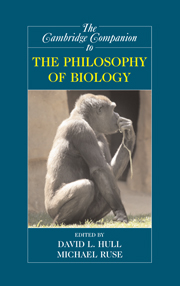Book contents
- Frontmatter
- 1 Adaptation
- 2 Population Genetics
- 3 Units and Levels of Selection
- 4 What’s Wrong with the Emergentist Statistical Interpretation of Natural Selection and Random Drift?
- 5 Gene
- 6 Information in Biology
- 7 Reductionism (and Antireductionism) in Biology
- 8 Mechanisms and Models
- 9 Teleology
- 10 Macroevolution, Minimalism, and the Radiation of the Animals
- 11 Philosophy and Phylogenetics: Historical and Current Connections
- 12 Human Evolution: The Three Grand Challenges of Human Biology
- 13 Varieties of Evolutionary Psychology
- 14 Neurobiology
- 15 Biological Explanations of Human Sexuality: The Genetic Basis of Sexual Orientation
- 16 Game Theory in Evolutionary Biology
- 17 What Is an ‘Embryo’ and How Do We Know?
- 18 Evolutionary Developmental Biology
- 19 Molecular and Systems Biology and Bioethics
- 20 Ecology
- 21 From Ecological Diversity to Biodiversity
- 22 Biology and Religion
- 23 The Moral Grammar of Narratives in History of Biology: The Case of Haeckel and Nazi Biology
- Reference List
- Index
- Series List
11 - Philosophy and Phylogenetics: Historical and Current Connections
Published online by Cambridge University Press: 28 April 2008
- Frontmatter
- 1 Adaptation
- 2 Population Genetics
- 3 Units and Levels of Selection
- 4 What’s Wrong with the Emergentist Statistical Interpretation of Natural Selection and Random Drift?
- 5 Gene
- 6 Information in Biology
- 7 Reductionism (and Antireductionism) in Biology
- 8 Mechanisms and Models
- 9 Teleology
- 10 Macroevolution, Minimalism, and the Radiation of the Animals
- 11 Philosophy and Phylogenetics: Historical and Current Connections
- 12 Human Evolution: The Three Grand Challenges of Human Biology
- 13 Varieties of Evolutionary Psychology
- 14 Neurobiology
- 15 Biological Explanations of Human Sexuality: The Genetic Basis of Sexual Orientation
- 16 Game Theory in Evolutionary Biology
- 17 What Is an ‘Embryo’ and How Do We Know?
- 18 Evolutionary Developmental Biology
- 19 Molecular and Systems Biology and Bioethics
- 20 Ecology
- 21 From Ecological Diversity to Biodiversity
- 22 Biology and Religion
- 23 The Moral Grammar of Narratives in History of Biology: The Case of Haeckel and Nazi Biology
- Reference List
- Index
- Series List
Summary
Philosophical arguments have played an influential role in the development of phylogenetic systematics - the field of biology that seeks to reconstruct the genealogical relationships among species, discover the pattern of events that has led to the distribution and diversity of life, and use this knowledge to construct natural classifications of species. Three sets of discussions clearly demonstrate this connection between philosophy and phylogenetics: inference modes and their relevance to competing phylogenetic methods, the nature and treatment of species and higher taxa, and the nature and treatment of phylogenetic evidence (character data). Within each of these areas, systematists have used philosophical arguments to defend particular concepts and methodological approaches, or to propose new ones. And, within each of these areas, philosophers have scrutinized the arguments of systematists and contributed their own.
Vigorous debate amongst systematists regarding these topics is pervasive. A common underlying tension that helps drive such debates revolves around the proper roles of process theories, assumptions, and trained judgment in phylogenetics research. For example, concerns about objectivity and testability have sometimes led systematists to reject methods that depend on evolutionary process theories, but such rejections typically do not 'stick' for very long. Thus, a cyclical pattern is evident - attempts to infuse theoretical dependence into phylogenetics research have repeatedly been countered by charges of non-objectivity and decreased testability, yet attempts to avoid them have repeatedly been countered by charges of operationalism.
- Type
- Chapter
- Information
- The Cambridge Companion to the Philosophy of Biology , pp. 211 - 232Publisher: Cambridge University PressPrint publication year: 2007
- 8
- Cited by



